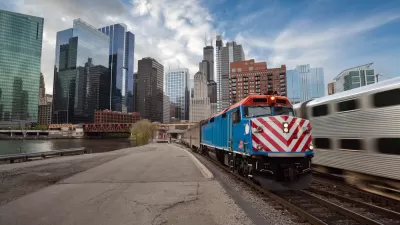The Obama administration has pumped $2.5 billion in stimulus funds into the advanced battery industry, with the goal of creating manufacturing jobs. But will supporting green cars mean supporting sprawl in the long-term?
Several urbanist writers have been remarking on a recent New York Times article titled "Does America Need Manufacturing?" The article focuses on the Obama administration's embrace of the lithium-ion battery industry, which it sees as a win-win because of job creation combined with green technology. But commenters wonder if creating batteries that extend the life of the car industry is a good thing.
Matt Yglesias writes:
"As long as the federal government remains formally and informally committed to the proposition that "what's good for General Motors is good for America" it's not really possible to have sound transportation policies writ large. You can try to take this cars/oil/steel industrial policy and nudge it in a greener direction with subsidies for electric cars, but no car-focused industrial policy is going to be as green as backing away from having the most energy intensive possible built environment of roads, homes, and offices."
FULL STORY: Automobile-Focused Industrial Policy

Alabama: Trump Terminates Settlements for Black Communities Harmed By Raw Sewage
Trump deemed the landmark civil rights agreement “illegal DEI and environmental justice policy.”

Planetizen Federal Action Tracker
A weekly monitor of how Trump’s orders and actions are impacting planners and planning in America.

The 120 Year Old Tiny Home Villages That Sheltered San Francisco’s Earthquake Refugees
More than a century ago, San Francisco mobilized to house thousands of residents displaced by the 1906 earthquake. Could their strategy offer a model for the present?

In Both Crashes and Crime, Public Transportation is Far Safer than Driving
Contrary to popular assumptions, public transportation has far lower crash and crime rates than automobile travel. For safer communities, improve and encourage transit travel.

Report: Zoning Reforms Should Complement Nashville’s Ambitious Transit Plan
Without reform, restrictive zoning codes will limit the impact of the city’s planned transit expansion and could exclude some of the residents who depend on transit the most.

Judge Orders Release of Frozen IRA, IIJA Funding
The decision is a victory for environmental groups who charged that freezing funds for critical infrastructure and disaster response programs caused “real and irreparable harm” to communities.
Urban Design for Planners 1: Software Tools
This six-course series explores essential urban design concepts using open source software and equips planners with the tools they need to participate fully in the urban design process.
Planning for Universal Design
Learn the tools for implementing Universal Design in planning regulations.
Clanton & Associates, Inc.
Jessamine County Fiscal Court
Institute for Housing and Urban Development Studies (IHS)
City of Grandview
Harvard GSD Executive Education
Toledo-Lucas County Plan Commissions
Salt Lake City
NYU Wagner Graduate School of Public Service





























